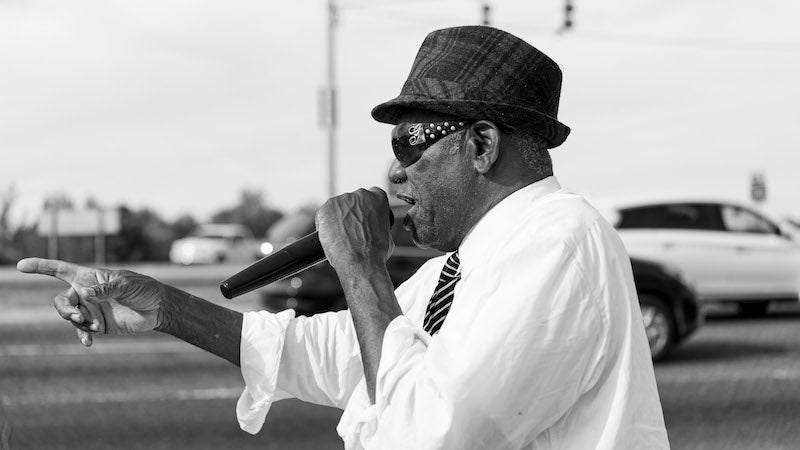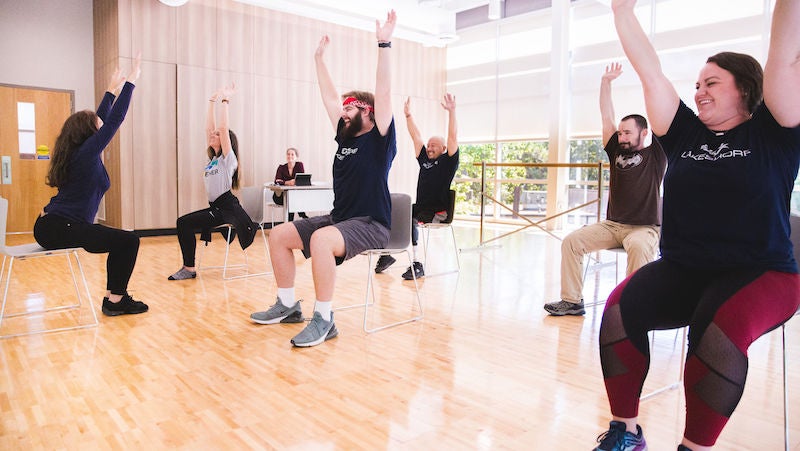By Melanie Peeples
Photos by C.W. Newell
Most never knew his name. Or where he came from. Or why he did what he did. But they came to count on him. Every Saturday, for nearly 20 years, blistering heat or freezing weather, as they went about their weekend errands, he was there. Until he wasn’t.
Generations of children have grown up in the back seats of their parents’ cars with the stranger they called “The Jesus Man,” standing on the side of Lakeshore Parkway near Walmart with a microphone and speakers, telling them all about Jesus.
He was there for the woman who stopped, on her way home from a funeral, despondent over the death of a dear friend’s son, and he held her hands and prayed. It began to rain but there they stood, holding hands and praying. The woman says she knew God was there.
There were also the signs. More than 100 signs, printed in extra-large letters so they could be read whether your car was stopped at the light or you were just passing through. In what came to be a virtual remembrance on Facebook, thousands commented about the signs. One woman wrote that when she found herself needing direction she would ask God to talk to her through his signs. “Never once did the scripture not apply,” she wrote on Facebook.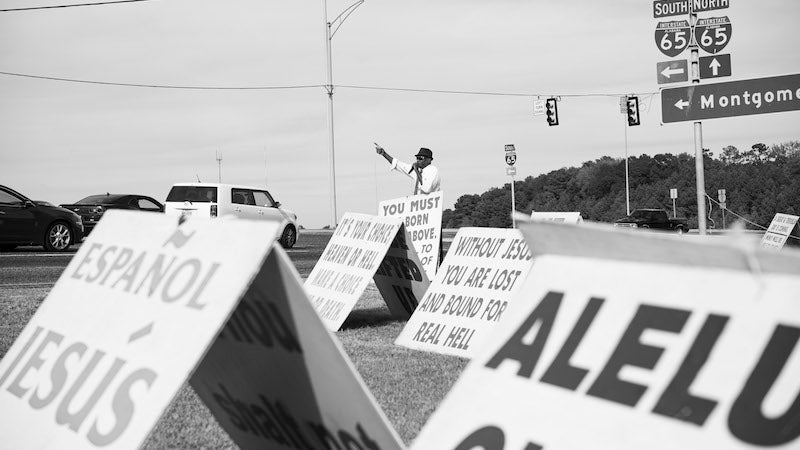
Perhaps the most memorable sign was the one read that read, “Honk if you know Jesus. Stop if you don’t.” Genesis Batemen, who now lives in Boston, grew up in Homewood, spending parts of so many Saturdays in the back of her mother’s car on her weekly trips to Sam’s Club. “My mom would always honk her horn whenever she saw him and he would jump with joy at everyone who honked at him,” she says. Genesis was around 7 or 8 the first time she really noticed him. Now 25, and mature in her faith, she said in a recent interview that he had a profound impact on her life.
“He was an icon. Everyone knew The Jesus Man. If you didn’t know him when you moved here, you eventually would see him,” she says.
Like most cities in the South, Homewood has a large number of churches—four within a half mile of one stretch of Oxmoor Road. But Genesis said none of them ever made as much noise as The Jesus Man did on his one corner of town. That’s not a criticism of churches, she was just so moved by the man’s own faith and dedication. Genesis says she wishes she’d stopped to get to know him.
That’s a common refrain among those who learned in August that The Jesus Man had died. But Neil Yawn was one of those who did stop to talk to him. As a paramedic on an ambulance from 1990 to 2007, he passed by a lot of times. And he said he and his paramedic partner stopped to talk at least 15 to 20 times, whenever they could spare the time. He said it was a rare treat to spend time with The Jesus Man.
“When he talked you just wanted to sit there and talk and listen to him,” Neil says.
Of course, there were those who did not appreciate The Jesus Man. “We were standing there one day and some people rolled their windows down and cussed him,” Neil says. “He just looked at us and said, ‘Could we just pray for those folks? They need help.’”
Neil says he asked The Jesus Man why he wasn’t in a church somewhere, and it turns out he had been a traveling preacher and at one time had his own church but it had burned down. And at any rate, The Jesus Man told him he had been led right there to that place. “He said he was leading more souls to God there than he had in all the churches he had been in,” Neil says.
Others who took the time to stop and meet him were rewarded just to be in his presence. People like Mike Smith, who used to work construction in Birmingham but now lives in Northern Georgia. “He was the most genuine, happy man I’ve ever met.” Mike says he went back three or four times over the years, just to spend time with him.
Of course, there where those who did not appreciation The Jesus Man. Some yelled racial epithets, others told him Jesus wasn’t real. But there he stayed. Mike witnessed people throw drinks at him. “He smiled and waved at the people that threw it and then as soon as they drove off, he laid his sign down and he went over there and picked up the trash.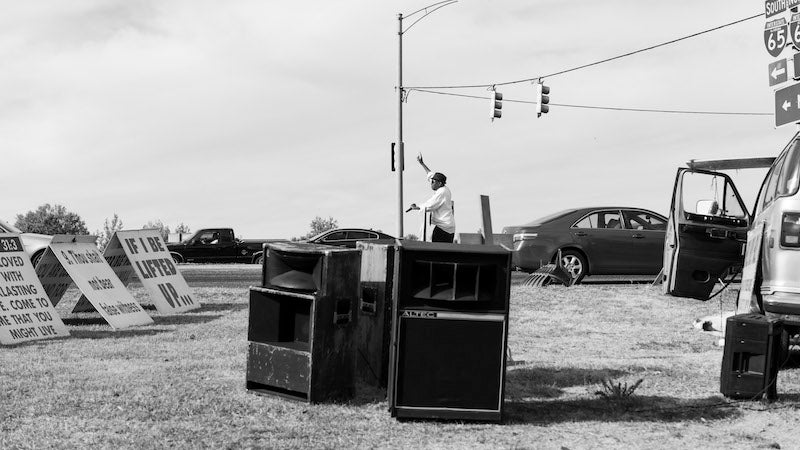
The Jesus Man also had a way of teaching other lessons too. In a world where people can be so quick to criticize the differences in others, Karen Rankin saw in him a chance to teach her daughters tolerance.
“I’ve always pointed him out to my children.” She’d tell them, “Look at him! He really believes in what he’s saying and he is following through so that he can share his message with other people. I just felt like he was a wonderful example of what dedicated people are about.”
“He put himself out there and he was loud and he was outspoken and he didn’t care about what anybody thought about his signs or the fact that he was on a loudspeaker,” Karen says. “He believed it with his whole body. To be out there in the middle of the summer in a suit and a hat…He was dressed up and he was just preaching from his heart, and I thought that was a wonderful example of what people can do with a message that they’re willing to put themselves out on the line.”
Karen came to think of him as being a part of Homewood. A special gift, you could say. “We could count on the fact that he was going to be there,” Karen says, “and we liked it. It was kind of comforting.”
And as the years passed, as The Jesus Man got older, Karen noticed. Anytime she didn’t see him on her Saturday errands, she worried. So did a lot of people.
The Jesus Man was 80 when kidney failure and coronavirus finally took him home, Aug. 11, according to his youngest son, Isaith Brown.
He had been born in Jamaica and moved to Florida in his 20s, where he worked cutting sugar cane. But he made his way up to New York, learned carpentry and went to Bible school for three years, finally fulfilling the call he had heard as a young man in Jamaica. While in New York, he helped other members of his family immigrate, before falling in love with a woman whose family lived in Alabama. He followed her down South, in the ‘60s, his son said, “a hard time to be an immigrant in the South, not to mention Black.” 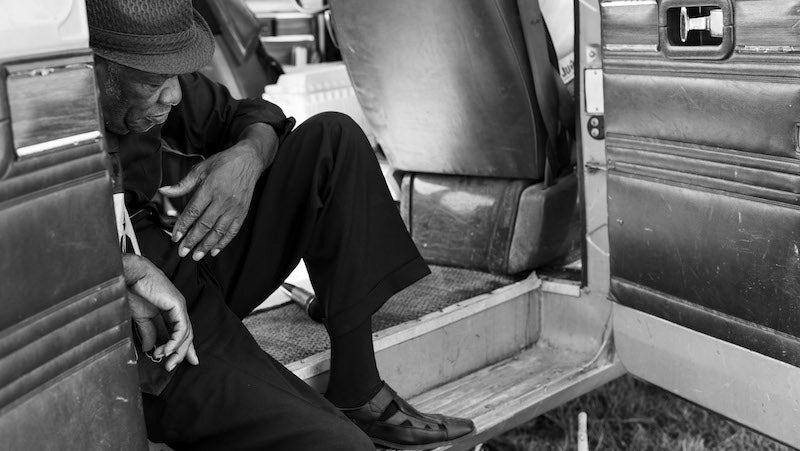
Isaith said his father knew how to do carpentry and a little bit of everything. “He knew how to work on houses, build a foundation or do a little plumbing and electrician [work],” he says. In time, The Jesus Man created his own company, and bought houses before fixing them up and renting them out.
He started saving his money to start his ministry, preaching on the streets in different places. He finally did establish that church he had dreamed about as a young man in Jamaica, but eight years ago it burned down and he didn’t have insurance. Isaith said his father tried to start it back up in a house, but it didn’t work out. All along, he never stopped preaching on the streets, and you could say Lakeshore became his home church.
The Jesus Man believed he was right where he was supposed to be. And if you do the math, (according to the Alabama Department of Transportation, some 60,000 cars a day drive that section of Lakeshore), 60,000 cars a day, 52 days a year, for 20 years … The Jesus Man reached far, far more, than he ever could have inside four walls.
It was never about who he was, but The Jesus Man’s name was John Gelpin Brown.
Continuing the Legacy
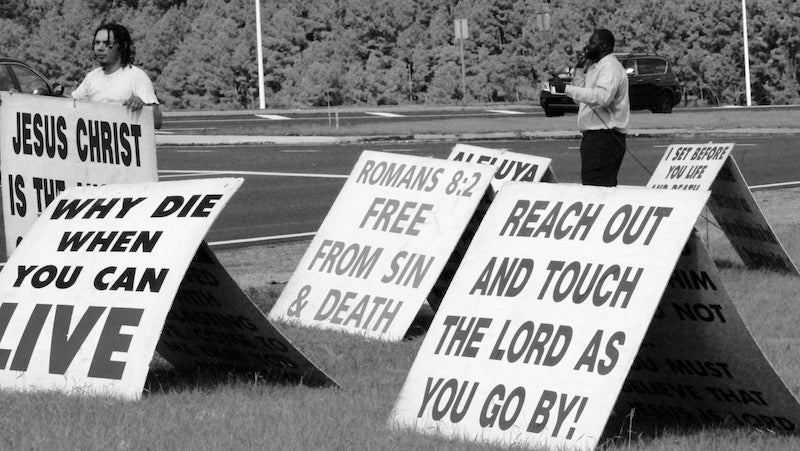 Photo by Selah Vetter
Photo by Selah Vetter
Isaith Brown grew up with his father preaching on the side of the road. As a small boy sometimes he would go with him, but when Isaith got to the age of 14, sports on Saturdays kept him from accompanying his father. But he returned to his father’s side this past June, just a couple months before his father died.
He’s 27 now—still a young man—and says he’s only really now understanding the effect his father had on people. “He knew he made a big impact. It was me who didn’t really understand the big impact that he had,” Isaith says. “I did not comprehend it until his passing.”
Since then, people have been stopping to tell him how much his father meant to them. He sees it now, and he wants his father’s legacy to continue. You can find Isaith out there, now, along with Xavier Jackson, who shared preaching duties.
Xavier has actually been accompanying John Brown for several years, ever since the day eight years ago when he pulled off the road to find out who John Brown was. He felt the connection immediately. “When I saw him, ‘I thought, this must be God.’” God working on earth. Xavier says he prayed about it and began calling John every day. For several weeks he said John did a daily Bible study over the telephone with him and his wife. A couple months later he asked John if he could come out there with him on Saturday.
To Xavier, what the public saw driving past was only a fracture of who John Brown was. He says John would load up his van and drive through the poor parts of town, handing out food to the hungry and the homeless. “It wasn’t for show,” Xavier says. “He was sincere about everything that he did for the Lord.”

